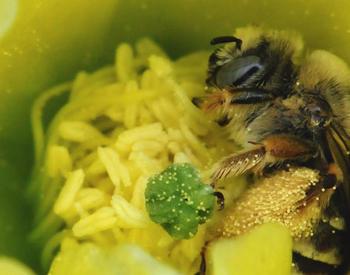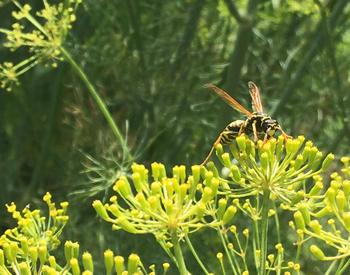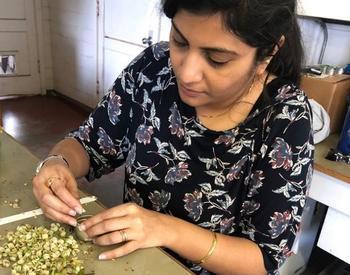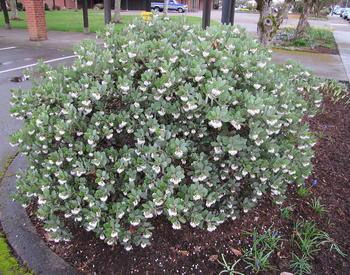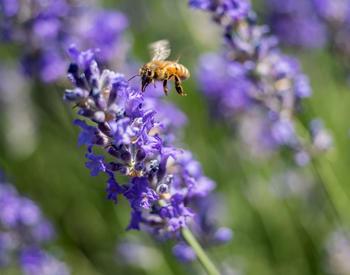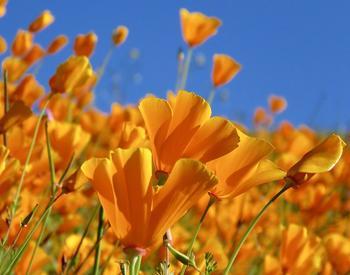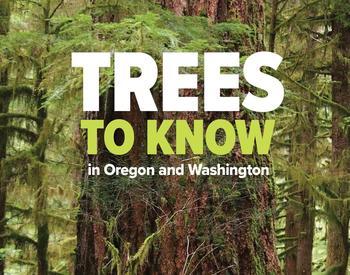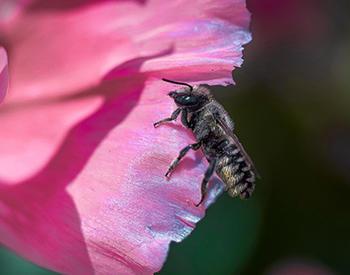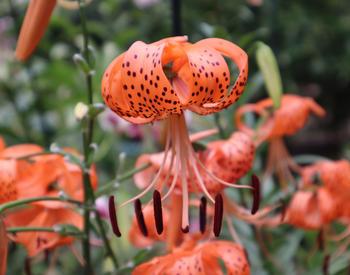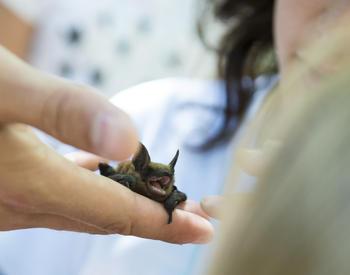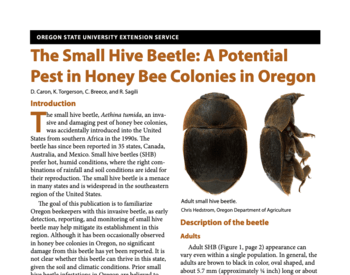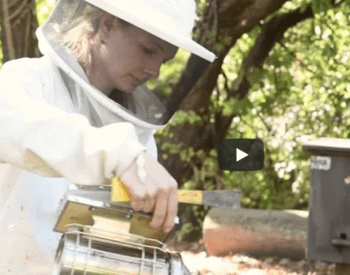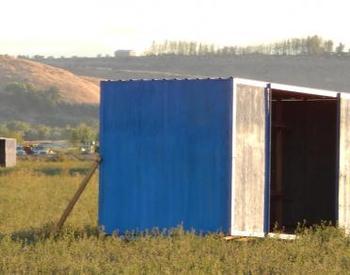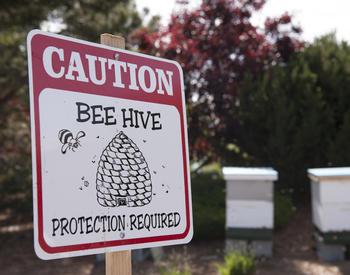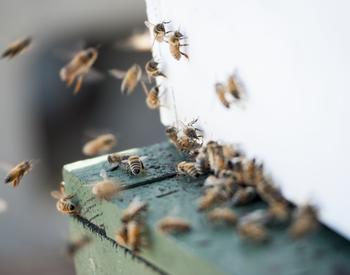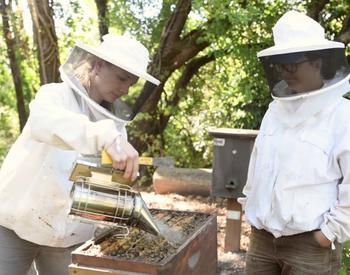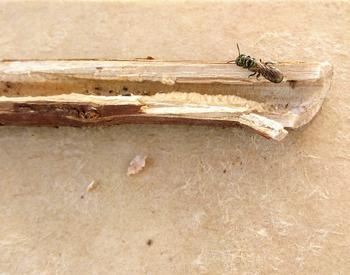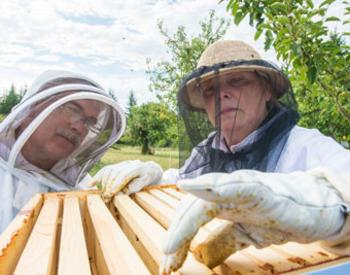Transcript
238 - National Pollinator Week 2023
Andony Melathopoulos: [00:00:00] From the Oregon State University Extension Service, this is pollination, a podcast that tells the stories of researchers, land managers, and people like you who are making bold strides to improve the health of pollinators. I'm your host, Dr. Adon Opolis, associate Professor of Pollinator health in the Department of Horticulture.
Unless you live under rock. You know that next week is National Pollinator Week, June 19th, the 25th. It is our opportunity to get together and celebrate all the pollinators those with backbones and those without throughout North America. The national Pollinator Week, as you remember from a previous podcast, is organized by the north American Pollinator Protection Campaign.
And this year there's a whole lot of events in the Pacific Northwest. Just, looking around the region in Eugene Library, [00:01:00] there's an event on June 20th in Boise. There's a garden tour on j June 21st, port Townsend, June 22nd. And then there's a whole lot of events on June 24th, last day of National Pollinator Week, north Clackamas, parks and recreations, city of Olympia, a bunch in Vancouver, British Columbia.
One thing I do wanna say, I'm really excited for British Columbia because, BC place, Burnaby City Hall, and Coquitlam City Hall are all gonna be lit up in black and yellow bands to celebrate our pollinators. So good job British Columbia. I myself am gonna be busy. I'm going to be in Newport on June 22nd in the evening at Wolf Tree pub in Newport for the pollinator Pub Palooza.
I'm gonna be in Esda the next day at the Oregon Family Forest Convention, where we're gonna be talking to. Woodland owners is about creating pollinator habitat on their property, and then the weekend is packed with beekeeping stuff. Oregon Master Beekeeping Conference on Satur field Day on Saturday, as well as Lin Benton [00:02:00] County Field Day on Sunday to get me jazzed up and prepared.
I knew there was one person I needed to talk to. That's Michael Ola. A Laughlin is a master Tologist. He is a master gardener. He is a pro at public engagement, and in fact, he's organizing on behalf of Clark. Public utilities, an exciting event that I think is gonna be the highlight for the region, the Pollinator Festival, which is gonna be in Vancouver, Washington on June 24th from 10:00 AM to 4:00 PM that's gonna feature some amazing vendors.
As well as Doug Tami. It's a family friendly event with food trucks and all sorts of Oregon B projects gonna be there. The Washington B Atlas. It's gonna be a fantastic event. Anyways, so this week let's talk with Michael, a Laughlin about public engagement as well as this pollinator festival in Vancouver, Washington to kick off this annual.
Week of pollinator celebration.[00:03:00]
Okay. Have I ever had you on this podcast war?
Michael O'Loughlin: I think I've been on it twice, actually. Oh,
Andony Melathopoulos: all that being the case, welcome back Michael, a Laughlin to pollination. Thank you. Now we are, I'm really excited. This, we had lockdowns and covid and there was not a lot of pollinator activi pollinator outreach activities, but now it's just everywhere.
And I'm a, there's one happening in Vancouver, Washington. That I want. I heard about that you are helping organize. Tell
Michael O'Loughlin: us a little bit about it. I am Clark Public Utilities, where I work is holding their very first pollinator festival and we started a pollinator initiative in 2021. And our goal is to responsible to use our own property, whether it's our office building or rights away, et cetera, and put pollinator habitat on those properties.
So in 2021, we planted two gardens. And then in 2022 we planted a third garden as well [00:04:00] as a pollinator meadow under our solar panels at Community Solar. And that next progression of this whole thing is then the outreach to the public. And so we're having a pollinator festival on June 24th, which is the last Saturday of National pollinator week.
And we have Doug Toay who's what he's actually coming out of the, out of Hawaii to come. And he's actually going to do in-person seminar for us. And if you don't know about Doug Toay, he is an amazing speaker. A hope. Full speaker about how we as individuals on our own, in our homes, in our businesses can make a difference.
Andony Melathopoulos: This is a great connection. So in addition, so starting from doing pollinator initiatives within the company having a public outreach event, having Doug, Tommy talk about his initiative, everybody should be like, we can make a national park from all our little, like pieces of property. We can, do conservation.
I really linked together Event. So what, as somebody who comes to the event, what are they gonna tell us? What a day's gonna be like?
Michael O'Loughlin: Day [00:05:00] from 10 in the morning till four in the afternoon. We have food trucks, we have music. You can come and grab some of the chalk and color in one of our tile squares on our courtyard.
We'll have presentations beyond just Doug home. We're going to do a couple tours of our pollinator meadow. You can find out how to install Apol Pollinator Meadow. We'll also do a tour, two tours actually, of our pollinator garden. And we'll go through how we designed it, why we designed it for lower maintenance, the plant choices we made, et cetera.
And then there are a host of booths from farmer's market booths where you can get soaps and honey, et cetera, to just about every agency and university in the area that have programs like Oregon State's Master Tologist program. We'll be represented. Oregon Beat Atlas and the Washington Beat Atlas will be there.
It's a full day and if you have kids, we'll have a whole kids section. We'll be on kids crafts as well.
Andony Melathopoulos: Now I just coming back around to it cuz I, I now remember. Am I'm [00:06:00] getting old, but I, the last time we had you on the podcast, you were talking about Yamhill County, where we're recording this podcast doing low maintenance pollinator habitat on roadsides, and you were talking about establishing pollinator meadows and learn, having a little bit of a workshop on this.
What are the tricks? What's the kind of trickiness about. Everybody wants it. Lee, you saw the sound of music and you saw Julie Andrews twirling around, like how hard could it be to make that thing? Tell us about what people might learn about
Michael O'Loughlin: establishing Meadows. I think the toughest part is we need to realize that where we're trying to establish these meadows are not a natural area.
They are. Whatever they're, where the home was built and we've got fill dirt or it's not natural. What we are fa facing most of the time is we're fighting the weed issue. So it takes a lot of prep weed, prepped our meadows for over a year where we would tell it, kill the weeds till it kill the weeds constantly to try to get that seed bank out of there.
Yeah. I think the other thing is if you were to type into Google Pollier Meadows and it comes up, they'll be the most beautiful all in bloom meadow. But that's not a [00:07:00] natural meadow. Yeah. Meadows have a season. They will dry out. That's natural. That's a good process because that means they're all going to seed, which means then the birds are coming in then and getting seed from 'em as well.
Okay. And I think we need to realize too, that there's a succession. So you'll have plants, let's say blue blue head, Gilead an annual. It's great. Comes up. Blooms right away. Ours is in full bloom right now. Eventually that plant will be out-competed in the seed mix. And the perennials will start taking over.
So through the years, it will change and there'll be a few dominant species in the end. So if you want, if you have a particular look you want, you will have to go back in and reseed at some point if you want to try to start back in square one. I
Andony Melathopoulos: suppose the lesson is as well is that you do need a balance of the, planning for the future.
And if you just I love Gilead. I want it to be Gilead forever. You will fail. But knowing that Gilead's as a, as an annual is there to give you some punch right at the early end, but that it is gonna fall out and you need to think about. What plants are gonna [00:08:00] be filling in that area that aren't gonna be weeds.
That
Michael O'Loughlin: must be the trick. Yeah. Because if you think about it the meadows that we see naturally, those are evolution for thousands of years and we're trying to game the system in a couple of years. We can't really game that system. The only way to do that is you'd have to literally probably after two years, kill everything, relow it, replant again, if you look at a little broader approach of, it's okay if this goes through succession and I can always come back and reseed like I said.
And live with that method, I think. It will be a little less of a tug on heartstrings. But you need to know that now if you want an exact look of a garden, then start planting roded engines or whatever cuz they all stay in the same place and yeah. You won't have to worry about that.
Andony Melathopoulos: Okay. So there's gonna be a workshop on that. We're gonna have Doug, Tom, we talking we have all these vendors. Food fun. There's gonna be family events.
Michael O'Loughlin: Am I missing anything? No, it's, yeah, it's a full day's worth of events if you want, or just come for, the first half or the second half and enjoy yourself.
It's all free, so there's no [00:09:00] cost. And we've got plenty of parking. So
Andony Melathopoulos: June 24th last end of national Pollinator week. And w just we're gonna have the information in the show notes, but where do people
Michael O'Loughlin: show up? So this is at our operation center. So if you're not familiar with with Vancouver and or our operation center, best probably to type in Clark Public Utilities Pollinator Festival, go on the site to get the address.
It's right on the corner of a hundred 17th and Patton Parkway. So if you're in Vancouver, you know where that's at cause that's where the community Solar array is. So it's very dominant on that corner. But probably best just to go to Clark Public Utilities website. And look at the poller information, and it'll have the seminar schedule in there, all the vendors that are gonna be there, et cetera.
So you know what you're looking at before you come. One
Andony Melathopoulos: last thing before I let you go. You, I have seen you have done some magnificent public displays and I think there's lots of our listeners who are looking to engage the public at a tabling event. What to you makes a good.
[00:10:00] Tabling it where the public is coming to you on their own volition. They aren't obligated and you're trying to engage them. What? Tell us, what, you know from the point that you see the they look at you briefly. Tell us what. Makes it work well.
Michael O'Loughlin: I think that when you're trying to engage the public try to think of them at about the fourth grade level as far as experience with the subject matter.
You don't wanna get too sophisticated at the top. You don't wanna have signage that has lots of words on it, et cetera. You want to have lots of visual displays. It's really easy when you're in the pollinator world, cuz you could have beautiful butterflies, all these fancy bees, you really start just blowing their mind.
And one of the greatest opening question on the native bees is how many species do you think are sitting here in Washington or in Oregon? Because generally speaking, most people undercount it by hundreds. Yeah. And then you just start. Asking a few open-ended questions of the people who are attending.
A lot of people will say something like do you raise honeybees? And the answer might be no. And then the conversation has just stopped at that point. But if you said, Hey, what in this booth? Why did you come over here in the [00:11:00] first place? What interested you? What did you see? I see you were looking over in this direction.
Are you interested in butterflies? That opens a discussion and it is amazing how much people want to learn. They're at that event for a reason. You just have to get 'em. Even the most gregarious people tend to. Be a little bit shy about coming up to booths, but if you open up with an open-ended question and you can start a conversation, hardest part's getting rid of them, then I
Andony Melathopoulos: think that's a, the gr a great it, it does elicit from them.
Cuz I think my rookie mistake when I first started doing is I just bombarded the poor soul without getting a sense of what their interest was. And those open-ended questions like you have the display, it brings them in. Yeah, I think it does get them to what are their interests?
Some people aren't in, they're interested in honeybees right from the start and you can launch into, or they're interested in native bees and you don't have any of those places to pull. And I think good, effective A good, effective engagement has that
Michael O'Loughlin: quality about it? Yeah, I find out where they're at.
Because it's interesting because people like to talk about their interests, but unless you open that up and you're just feeding them [00:12:00] information, you just kinda make a little blockade artificially formed. Fantastic.
Andony Melathopoulos: I'm looking forward to this June 24th again. When does it start?
Michael O'Loughlin: 10 o'clock in the morning.
10 o'clock in the morning.
Andony Melathopoulos: I'm gonna, Be visiting those food trucks. It's gonna be a great day. Thanks so much for
Michael O'Loughlin: telling us about this event. All right, thank you.
Andony Melathopoulos: Thank you so much for listening. Show notes with links from each episode are available at the website pollination podcast dot Oregon state.edu. I also love hearing from you, and there's a form at the website where you can pop in and say hello and give me feedback. If you wanna support the show, remember to leave a rating on iTunes, Spotify, or whatever podcast mothership you use.
And finally, if you have the means and you want to help support my lab's effort to document the biodiversity organ, visit Oregon b atlas.org and follow down to the donate button where you can make a tax deductible donation to the Jerry and Judith Paul native Pollinator endowment. Every little bit helps.
See you next episode.[00:13:00]
It's National Pollinator Week next week. We hear about what makes effective public engagement on pollinators and of a new event in Vancouver, Washington, the Pollinator Festival.
Links Mentioned:
National Pollinator Week
Pollinator Festival (Vancouver, WA, June 24)
